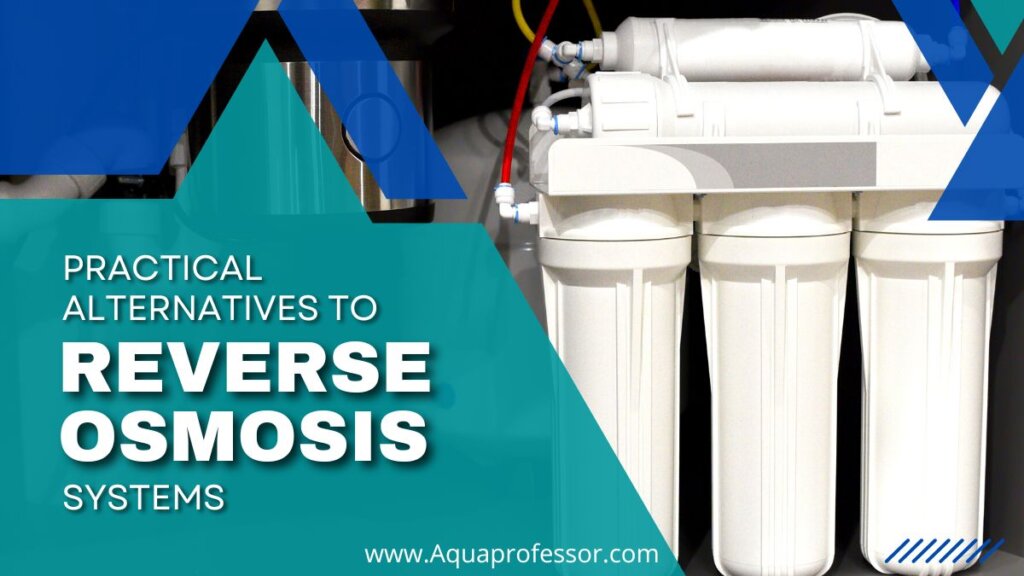
Despite being one of the best filtration techniques, reverse osmosis has downsides. Some of them include the lack of concentration of minerals in reverse osmosis water and high amounts of wastewater produced.
You can use several alternatives present in the market to resolve your water issues, like distillers, basic sediment filters, carbon filters, etc.
Here is a detailed guide on the 9 best alternatives to reverse osmosis systems. Follow this article to know which suits you the best!
9 Reliable Reverse Osmosis Alternative: Quick Sheet
| Alternatives | Water Purity | Water Wastage & Environmental damage | Maintainance & Installation | Overall Cost |
|---|---|---|---|---|
| Distillers | Remove almost all the impurities, just like RO | Requires use of electricity but least environmental impact overall. | Distillers are less expensive and low effort when it comes to maintenance as compared to RO Filters | $150 |
| Alkaline filter | Adds minerals to water | Lesser environmental damage | Easier to install and low maintenance | $30 |
| Carbon Filters | Lesser pure water than RO | Negligible environmental damage | Easier to install, and requires frequent cartridge replacements | $15 |
| Sediment filters | Only works for sediments, and does not remove organic chemical contaminants | Not much environmental damage | Easy installation and maintenance | $45 |
| Water Pitchers | Much lower efficiency as compared to RO | You will have more water waste with the RO, but that water is ultimately recycled. | Easy installation, zero maintenance | $12 |
| Ion Exchange | Works well for inorganic mineral ion impurities | Can cause water wastage | Easy installation and maintenance can be tiresome as the resin bed needs frequent cleaning and replacement | $11 |
| UV + UF | Good for the elimination of bacterial contamination | Negligible environmental damage | Easy to install and maintain | $7 |
| Gravity Filters | Less efficient than RO Filters | Negligible environmental damage | Easy to install and maintain | $35 |
| Countertop Filters | Work well, but they have a low filtration capacity | Negligible environmental damage | Easy to install and maintain | $42 |
Also Read: Top 5 Tankless RO Choices
1️⃣ Distillers
2️⃣ Alkaline Filters
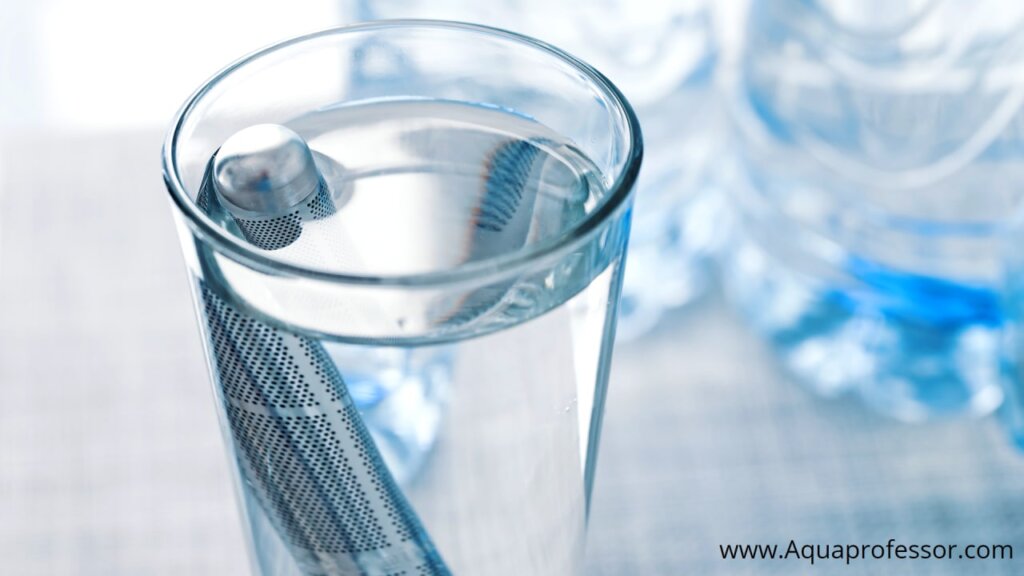
3️⃣ Carbon Filters
4️⃣ Sediment filters
Reverse osmosis filters do not remove the sediments themselves. Even they use a sediment prefilter to remove sediment impurities from water. Sediment filters help remove contaminants with a size of 5 microns or larger.
5️⃣ Water pitchers
Also Read: How To Take Apart Brita Pitcher
6️⃣ Ion Exchange
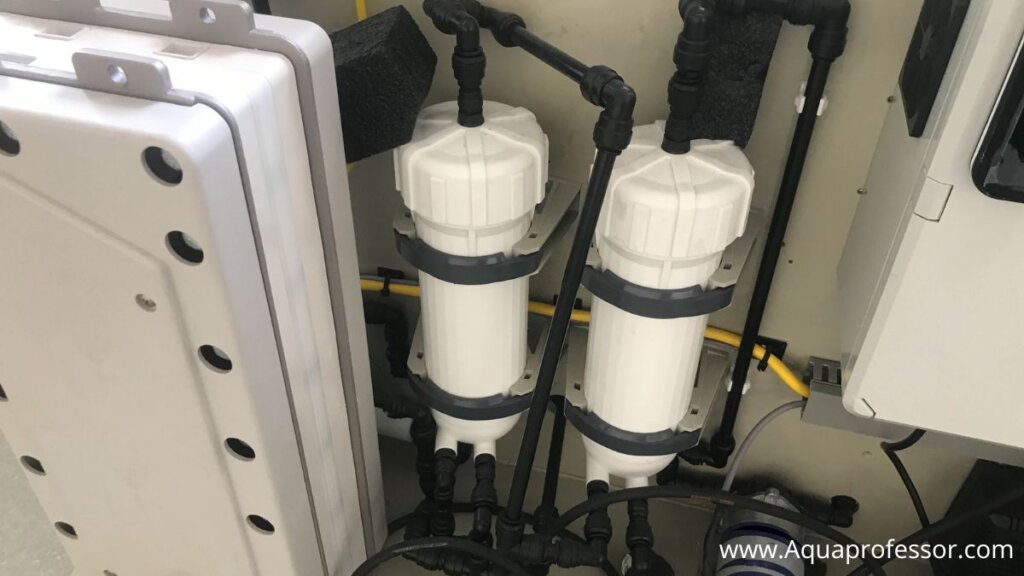
7️⃣ UV + UF
8️⃣ Gravity Filters
9️⃣ Countertop Filters
These small, easy-to-install filters are a good option for smaller homes and people on a budget. Although, you must note that countertop filters, being smaller in size, have a lesser output volume and may not be able to keep up with your household needs.
As a final note, know this:
"When filtering water you have to start with your reason for filtration before you determine the environmental impact. For example if someone says, "I have lead in my drinking water", then Alkaline, Carbon, and Sediment filtration won't do any good. *you can get Carbon filters with lead reduction*, but again, you have to determine need before environmental.
This is also true if you live in an area with almost perfect water. (I used to live where the water from the aquifer was almost perfectly clean and soft with no treatment). In this case we used sediment only because everything else was good."
-u/PercMaint in r/WaterTreatment
Why Shouldn’t You Use Reverse Osmosis? (Medical Science)

When it comes to the use of reverse osmosis as a filtration technique for water, there are many myths surrounding the topic. With the growth of the internet and social media, it has become easy to get anything and everything up on the web. It becomes difficult in such scenarios to tell myth from fact.
But don’t you worry, I’ve got you covered. Yes, reverse osmosis has some disadvantages, but not everything negative that you find online about RO systems is true.
Let’s discuss some common myths about reverse osmosis:
#1 Myth: Minerals in Drinking Water Are Necessary
Fact: While minerals (up to a certain amount) are necessary for the body, the source of the minerals is hardly ever an issue. Also, most of the body’s mineral requirements are taken care of by the food intake one gets.
Even in the best-case scenarios, only 6.5 percent of mineral requirements is provided by water consumption, and the rest is up to the food.
So, even though reverse osmosis water may lack certain minerals, it is not necessarily a major downside for the treatment method. Also, there are several ways in which one can have their reverse osmosis water remineralized.
#2 Myth: Reverse Osmosis Water Attacks the Body
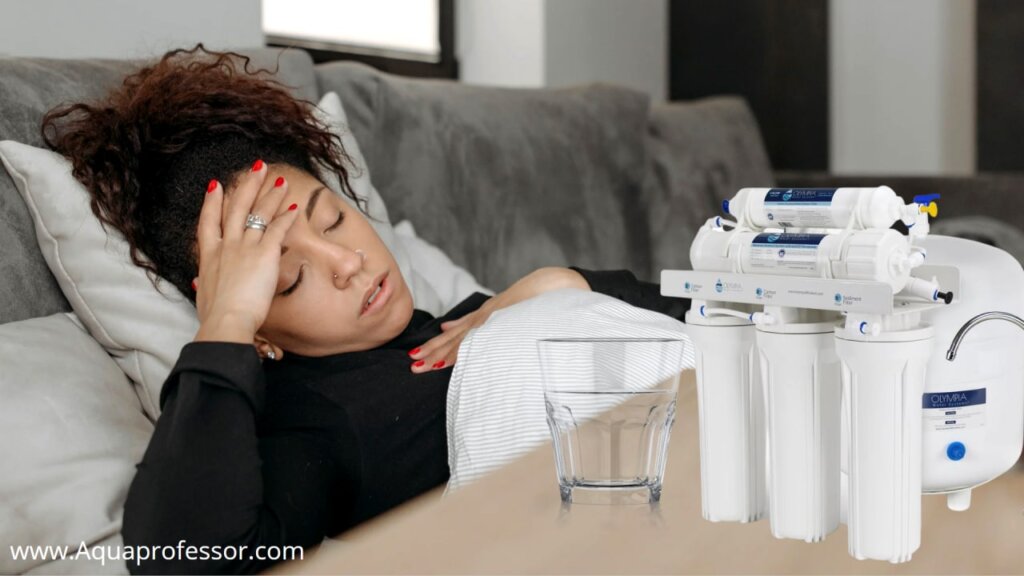
Fact: Even though reverse osmosis water may have low TDS levels, the notion that it may cause the degeneration of mucous membranes of the body or cause deficiency of minerals in the bloodstream is wrong.
No proven studies can say that the consumption of water with low levels of total dissolved solids causes any major health problems.
Many studies and surveys, including those done by WHO, say there is no health-based guideline value for TDS levels in water and that they are not established because it is not of health concern at levels found in drinking water.
#3 Myth: Alternative Technologies Are Just as Effective
Fact: Yes, there are quite a few alternative options available for reverse osmosis, but you have to keep in mind that they may not be as effective as reverse osmosis technology. The others might eliminate impurities up to a certain level.
Still, only Reverse Osmosis successfully eliminates all and every type of contamination, providing you with nothing but the purest form of drinking water.
Now that we have addressed some myths about reverse osmosis water, it’s time to flip over to the other side of the coin, i.e. the disadvantages.
There are a few disadvantages of reverse osmosis water as well, which are discussed in detail below:
Due to such limitations of the reverse osmosis filter, there are a few alternatives to this treatment method which we have already discussed earlier.
When Should You Not Consider RO Alternatives? (Don’t Ignore This)
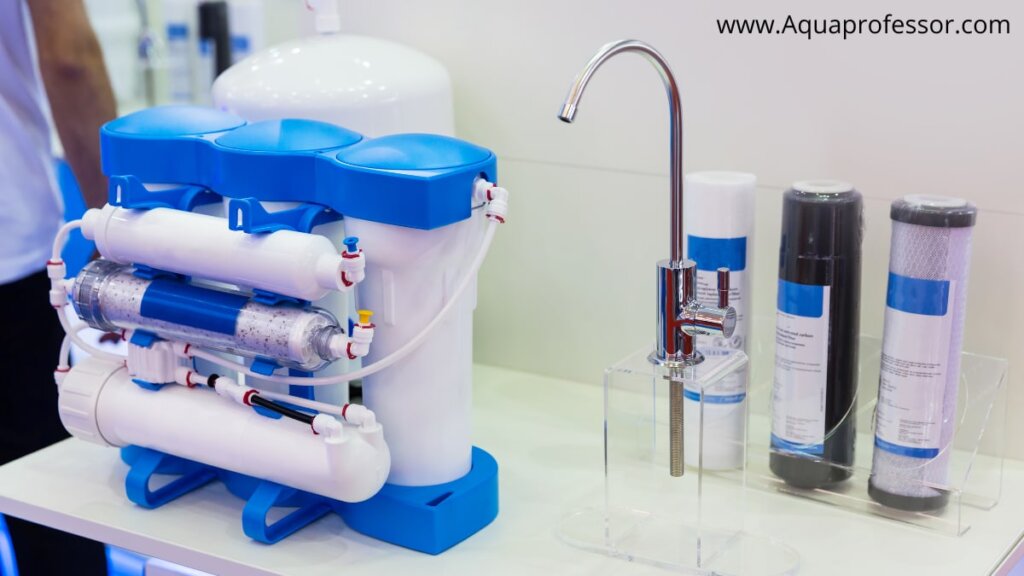
We have now covered the disadvantages and alternatives of reverse osmosis water. However, it is not always disadvantageous to use reverse osmosis. There are situations wherein the use of reverse osmosis water becomes necessary.
Also Read: Top 5 Waterdrop Filters
Before we dive into what all situations ask for the mandatory use of reverse osmosis, let’s understand how exactly the RO systems work.
Definition:
Reverse osmosis water filtration systems, or RO, are a purification technique used to eliminate contamination from water. Reverse osmosis uses a semipermeable membrane, and impurities and contaminants are removed from drinking water via diffusion through the semi-permeable membrane.
During reverse osmosis, two streams are formed, the solute stream and the solvent stream. In this case, the solvent stream is what is of use to us, as it is the purified drinking water suitable for consumption. The solute stream eliminates all sorts of chemical and organic impurities.
The reverse osmosis process is an excellent water purification method when the main water issue you are facing is the presence of bacterial and organic contaminants. The reverse osmosis membrane successfully removes all herbicidal or pesticide impurities from water.
While this may be a plus point for reverse osmosis, the downside is that reverse osmosis water may lack certain minerals like calcium, magnesium, iron, etc., that are necessary for human needs. Other than that, they are expensive and have tiresome maintenance considering replacement filters, etc.
Now, let’s talk about when exactly you should not consider reverse osmosis alternatives. There are some situations where going for a reverse osmosis alternative won’t suffice. Sometimes, the job can only be done by RO filters.
If you’re residing in an area where the water supply is contaminated with herbicides and pesticides, you should stick to reverse osmosis only. Only RO is the water treatment method that can resolve your water issues in this case.
If you’re worried about the lack of minerals in reverse osmosis treated water, remember that there are always several ways to remineralize water.
It is also a fact that most mineral requirements of the human body are tended to by the food intake, i.e. the minerals that are necessary for us are present in the food we consume and is not much dependent on our water intake.
Ensure you are consuming freshly treated reverse osmosis water and keeping up with your hydration needs.
Best Alternatives to Reverse Osmosis: Frequently Asked Questions
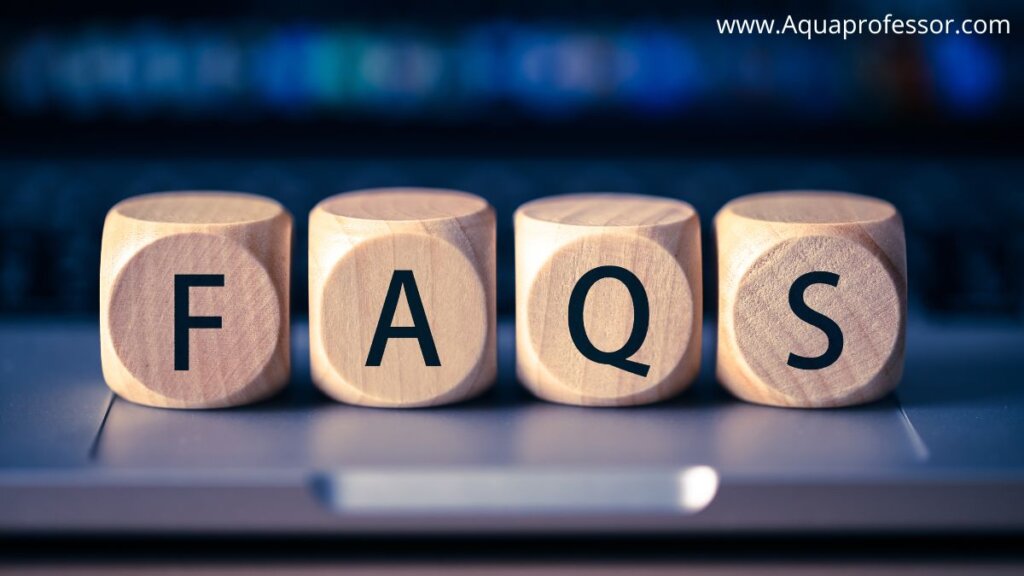
Is boiling water as good as reverse osmosis?
No. When it comes to purifying water, reverse osmosis is a much better option than boiling water. While boiling water may only remove impurities like iron and manganese, reverse osmosis is a much-advanced technique that removes the said mineral impurities, kills bacteria, and eliminates other contaminants from water.
Is reverse osmosis water banned in Europe?
No. Europe has not banned reverse osmosis water. Although many people may have decided to boycott reverse osmosis water, no European government has banned the use of reverse osmosis.
Do you need to filter water if you have a water softener?
Yes, since water softeners only resolve the issue of hardness in water, you will also need to add a water filter to eliminate other contaminants from water.
Does RO water cause kidney stones?
No. On the contrary, RO might help reduce the risk of kidney stones as kidney stones are formed due to excess calcium in the bloodstream. Since RO helps eliminate hardness minerals like calcium and magnesium, they help reduce the chances of risk of kidney stones.
Does RO water cause hair loss?
No. There have been no confirmed studies that indicate that the use of RO water contributes to or causes problems like hair loss.
Adarsh is a Health & Nutrition Sciences graduate with expertise in environmental health. He is associated with ventures like Glacier Fresh Filter and Simpure Filter Systems. Through Aqua Professor, he intends to provide helpful information to every home to help them make smarter decisions.

Hi Adarsh – The City where I live is going to implement a new system to add water back to the aquafer by recycling sewer water. My gut is telling me this sounds like a nasty idea! I am looking for a water filtration system for my house to allow me to sleep at night. I read up on reverse osmosis system but I would be consuming 3x the amount of water than normal.
Would you happen to have recommendations considering the forecasted project mentioned above?
Thank you,
Robin
Hi Robin,
Actually adding water back to aquifier by recycling sewer water is safe. Californian authorities are trying to recharge groundwater table in dry well area following the footsteps of Namibia city water treatment. So you don’t need an RO